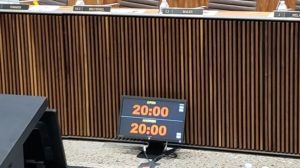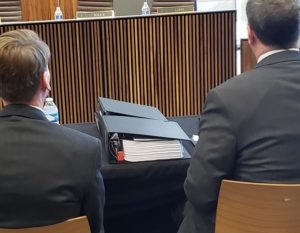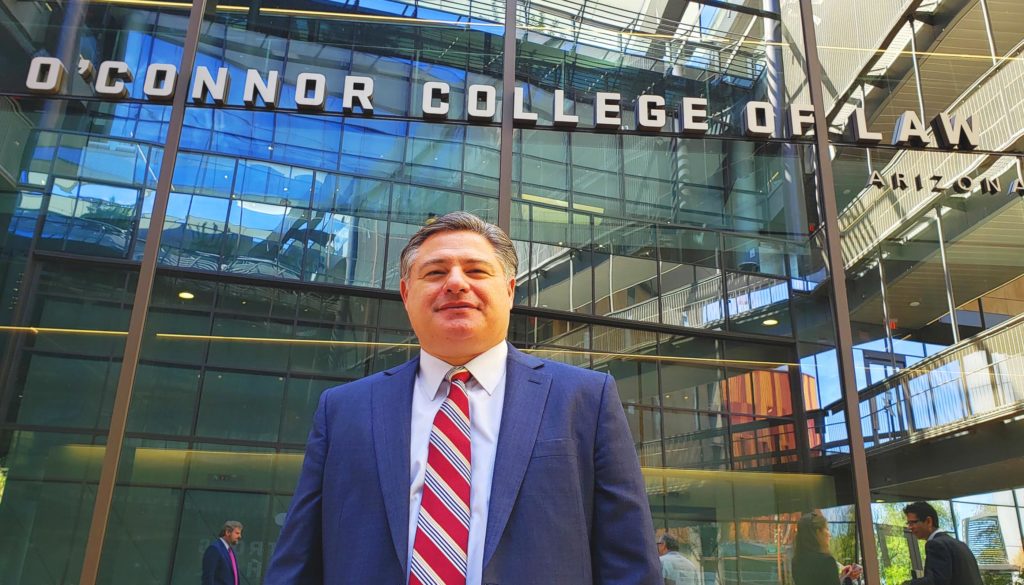(Notes from the Jones Case Supreme Court Hearing)
BY MIKEL WEISSER
The most-watched court case in all Arizona marijuana lived up to its name March 19th, as the Arizona State Supreme Court held the Jones Case oral arguments at the ASU Sandra Day O’Connor College of Law to an absolutely packed house. When the dust settled, speculating that the court will side with Jones was a virtual given. To say it was a mismatch would be an understatement.
Seasoned appeals-level defense attorney Robert Mandel brought his A-game. Sheila Polk sent her B-stringer, Assistant Yavapai County Prosecutor, Benjamin Kreutzberg, who was clearly out of his depth. “Never in my 22 years in the well, have I seen a beat down like that,” said Level One Labs owner/lawyer George Griffeth.
Griffeth wasn’t only one of the three hundred plus attending the special session of Supreme Court oral arguments who felt the Yavapai County Prosecutor’s case was surprisingly weak and wildly inaccurate. In addition to 250 ASU law students and various cannabis business leaders, multiple activist groups such as AZ-NORML, Phoenix Cannabis Coalition and Tucson’s Veterans United for Cannabis were on hand.
So many of the state’s cannabis legal elite were there, the entire front row had to be reserved for the multiple law firms and individuals who filed a total of 9 amicus briefs in case. A whopping 8 amicus briefs supported Jones, including Dr Will Humble, former DHS director. Sheila Polk’s PAC, the Arizona Prosecuting Attorneys Advisory Council, was the only brief supporting Polk. For reasons not explained, Sheila Polk was nowhere to be found, when the case she has pushed for five years finally came to trial.

“You could tell they did their research”
Each attorney was given 20 minutes for their oral arguments. Mandel’s case was fairly straight forward: no matter Polk’s assertions, AMMA does “immunize” patients and dispensaries from prosecution regarding cannabis resins, or concentrates, in its definition of “marijuana.” The protections are also laid out in the phrase “any mixture or preparation thereof” in the definition of “usable marijuana.”
Emphasizing that the resin of the cannabis plant is the active ingredient and the plant material itself is otherwise inert cellulose, Mandel pointed that voters never intended for children or respiratory patients to only be allowed smokable flower. Mandel also highlighted the use of language taken from the narcotic criminal code, words like “administer” and “manufacture,” noting those words were added consciously to include marijuana products, not solely dried buds.
Mandel (who’s argued cases before this very same Supreme Court before) settled into a comfortable, almost congenial rhythm with the judges, after his first exchange. At one point during Mandel’s presentation, Judge Ann A. Scott Timmer even joked with Mandel that she had learned so much about cannabis concentrates she could make her own brownies and the room roared. Seconds later, Judge Mark Brutinel quipped that parties at her house are going to be a lot more fun now. And even their fellow judges joined in the laughter.
Audience member, Jane Fix, a longtime patient advocate and head of patient services for Copperstate Farms, one of the largest cannabis grows in North America, was impressed with the depth of understanding of the specifics of cannabis concentrates that the judges brought to the hearing. “You could tell they did their research for the case.”

“It Was Brutal”
By comparison, Kreutzberg’s opening challenge (that cannabis violated federal norms) was thrown out by the justices before he even got partway into what he clearly thought of as well-crafted opening paragraph. And that was just his first humiliation. Despite heaving in with two massive three ring binders to prepare his arguments, Kreutzberg case proved as flimsy as a tissue and just as easily torn apart. After clearly agreeing with Mandel’s interpretation of the language, the justices outright rejected Kreutzberg’s interpretation of words like “administer,” “manufacture,” and “preparation.”
At one point, Judge Brutinel chided Kreutzberg for trying to define cultivation as the only “manufacturing” of products allowed. The best Kreutzberg could muster in response was that rolling marijuana cigarettes would also be construed as legal “manufacturing.” Several judges visibly rolled their eyes at that one.
Attorney Tom Dean, co-author of a brief filed jointly between AZ-NORML and the Arizona Attorneys for Criminal Justice, found himself almost feeling sorry for Kreutzberg by the time all was said and done. “It was tough to watch. He got beat up all right. He couldn’t defend Yavapai’s position, he kept contradicting himself. They weren’t buying any of it. It was brutal,” Dean grinned.
When Kreutzberg opined 2010 voters did not intend for concentrates to considered part of the program, Judge John Pelander (who came out of retirement to sit in on the case), asked why he would assert this when language regarding edibles and preparations was plainly written into the initiative.
The more Kreutzberg contended 2010 Arizona voters voted in supported whole flower cannabis, but did not support concentrates, the more the justices pushed back. Chief Justice Scott Bales openly challenged Kreutzberg’s faulty logic; “How can you attribute to the voters an intent to preserve a broad prohibition on cannabis and only permit a more-narrow definition of marijuana when the AMMA itself has a broader definition.”
It proved to be only one of many questions the justices asked that Kreutzberg could not answer. Judge Clint Bolick asked Kreutzberg if he had thought that CBD should be treated as a prohibited narcotic like “cannabis” since it too is a concentrated cannabis resin. Kreutzberg countered CBD luckily was not part of this trial. At another point, when Bales asked Kreutzberg if the amount of raw flower used to make the concentrates Jones was caught with would have exceeded the allowable weight for a patient, Kreutzberg stumbled with the conversion and again tried to brush off the question. Bales countered they could wait while he worked out the math, but the answer would have to be more than 20 to 1.
Timmer, in particular, hammered Kreutzberg about his interpretation of AMMA which suggested voters intentionally wanted patients to only use ineffective forms of edibles. She also noted that every act of consuming marijuana ultimately involves extracting the resins from the dried flowers. To highlight the absurdity of Kreutzberg’s argument, Timmer asked what if a person takes cannabis flowers and rolls them in their hands, leaving an oily residue. “Would the oily residue be prohibited?” When Kreutzberg tried to claim those dirty hands would be illegal under the Arizona Medical Marijuana Act, the room audibly groaned.
The whole thing would have been comic, if not for the fact Rodney Jones already spent 2yrs in prison over the case and dozens of patients are facing felony narcotics charges for vape pens and gummies due to Polk’s willful misreading of AMMA. After receiving more than two dozen calls from patient-defendants over the past nine months since the appeals court ruling was issued, AZ-NORML received two more calls from defendants during the hearing. Gary Smith, president of the Arizona Cannabis Bar Association, was blunt about the injustice of Polk and other county prosecutors devastating patient’s lives and squandering taxpayer resources with a case so clearly lacked any merit.
“I thought this showed just how morally repugnant that Yavapai County jailed Rodney Jones for two and a half years for what was little more than a political stunt,” Smith explained afterwards. “The issue had already been on trial with the Zander Welton case. If they really wanted to challenge the issue, they could have appealed that case instead of jeopardizing a whole different man’s freedom and taking away his liberty for two yrs.”
Due to the heavy Supreme Court caseload, court watchers believe it will be at least three months until the court’s final decision is in, but for virtually everyone in the room, Jones’ vindication seems inevitable. While there are limits to what he can say about an ongoing case, defense attorney Robert Mandel will be one of the feature speakers at the MITA-AZ meeting tonight.
You can judge for yourself. Here is a link to the official state video of the oral arguments.
 —Mikel Weisser is the editor of the Arizona Cannabis Monthly and state director of the Arizona chapter of NORML.
—Mikel Weisser is the editor of the Arizona Cannabis Monthly and state director of the Arizona chapter of NORML.

